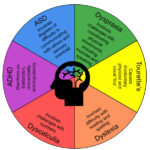 Neurodiversity refers to variations in the human brain and cognition, for instance in sociability, learning, attention, mood, and other mental functions. Research from the University of Otago suggests that this broad perspective on intelligence is increasingly being appreciated by organizations.
Neurodiversity refers to variations in the human brain and cognition, for instance in sociability, learning, attention, mood, and other mental functions. Research from the University of Otago suggests that this broad perspective on intelligence is increasingly being appreciated by organizations.
The paper provides some practical recommendations for companies to improve the inclusion of neurodiverse people. This is important as neurodiversity includes conditions such as ADHA, ASD, and dyslexia, and the authors believe there are various benefits from encouraging such diversity but that neurodiverse people are often frozen out and left unemployed.
“Embracing neurodiversity is both the smart and the right thing to do,” they explain. “Employing and supporting neurodivergent people within organizations also means potentially gaining access to a variety of skills. These include, but are not limited to, unwavering focus and pattern recognition capabilities, excellent analytical and problem-solving abilities, and memory and mathematical skills.”
Making things better
The authors provide a number of steps for employers to make things better. This starts by forgetting everything they think they know about neurodiversity and instead treating matters on an individual basis.
“This should include asking them what adjustments or accommodations will help support them to reach their full potential but also allowing them to tell you about their skills and strengths, and the challenges they face,” they explain.
They also urge employers to allow for individualization as much as possible throughout the whole employee lifecycle. A good starting point in this process is to shelve traditional recruitment methods, which they believe often disadvantage neurodivergent candidates.
“It would be much more meaningful and insightful to take a strengths-based approach and develop opportunities for each individual to demonstrate their capabilities,” the researchers explain.
“Diversity is about visible and invisible uniqueness among individuals so we cannot use the same measures and ways of evaluating all potential employees. If companies want to support and capture diversity, they need to be accommodating to give individuals the opportunity to show what they are capable of.”
Last, but not least, companies should strive to develop a culture where neurodivergent individuals feel safe and confident talking about their condition without any fear that they might be discriminated against or otherwise stigmatized.
These three steps are something the authors believe can be implemented by organizations regardless of their size or level of resources.
“Organizations need to be champions of diversity, and this requires having, recognizing, harnessing, and celebrating diversity at all levels,” they conclude. “Everyone deserves the opportunity to gain meaningful work.”